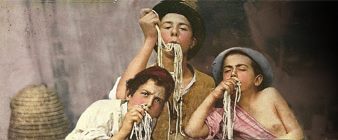

 |
 |

2000-year-old Almond CookieHome >> Recipes
Text-only version printed fromhttp://FXcuisine.com/default.asp?Display=136 Beautiful Italian Christmas sweet prepared from scratch using unshelled almonds, honey, lemon and bay leaves. A hit for the last 2000 years! This typical Christmas eve sweet from the Teramo province in Abruzzo, Italy, has been prepared in the same way for a solid 2000 years. It can also be prepared by dry-toasting the almonds in a frying pan and then adding some sugar and let it caramelize with the almonds. In some places they call it pepatelli, in others croccante. Croccante [craw-kantay]
I bought a bunch of almonds with their shells from an Italian grocer who drives up from way down the Italian boot to sell Sicilian produce to Swiss gastronomes. The real deal, I could not resist buying his almonds.
Start by shelling the almonds. Try not to damage the almonds. From a pile of unshelled almonds you'll extract only a handful of almonds. Of course you could buy already shelled and blanched industrial almonds at the store but there is much poetry from working with raw ingredients. The almonds were handed to me by a man who saw the Sicilian almond grower, and I'll see through the entire process until the sweet is produced. A real parable about the value of work. Plunge your almonds in boiling water. After two minutes or so remove the almonds with a slotted spoon, so that you can still return them to the hot water if needed. Great fun now. Squeeze each almond between your thumb and index finger. The sharp end of the almond will rupture the skin from within and bang, the wet almond will fly across the kitchen. You will end up with even less product than before. Now we will flavor the almond by roasting them in a medium hot oven until pale brown. You need to remain with your nose glued to the oven door throughout the entire roasting, as the difference between a delicious roasted almond and a hopelessly burnt one is but a few seconds. Wash your lemon with care and use your sharpest knife to remove the rind. You can also grate the skin, making sure to include as little of the bitter white underskin as you can.
Melt the honey in a small saucepan with the tiniest drop of water and bring to a boil. Use good honey, not some cheap corn syrup from the highway shop. Meanwhile, roughly chop your almonds. You want large chunks so don't overchop them. Add the almonds to the boiling honey and mix well. When the mixture is quite dry, reduce the flame to the lowest setting. Lightly oil a cutting board and spread the lemon rind in a square. Pour the hot almond-honey mixture over the lemon and sprinkle so more lemon rind on top. Cover and leave to cool in the fridge. As it cools down the the croccante will harden. Serve on a bed of fresh bay leaves if you can find them. I don't think the bay leaves are eaten but they make for an extraordinary contrast with the yellow rind. They may also symbolize perennity and hope that the vegetation will grow back in the spring to the farmers who eat this sweet for Christmas in Abruzzo. Happy Christmas and don't forget you read this on FXcuisine.com! 120841 views |
12 Comments
- #1
- Comment by Lyra
Your photos are gorgeous. Carravagio comes to mind...what do you use for your lighting? I'm stuck in a badly lit apartment, and it really makes getting good photos difficult, especially if I only have time at night.- #2
- Comment by Joanna
Beautiful - and doubtless delicious, too. How long did it take you to make?Happy ChristmasJoanna- #3
- Answered by fx
Thank you Joanna! The whole thing takes about an hour. For me it was more about using these beautiful ingredients and seeing the end product taking shape gradually from the raw ingredients than about making it quickly.- #4
- Answered by fx
Ah! You know how to speak to me. I'm glad you noticed my lighting and yes, I am indeed big on Caravaggio and decided to use only one light from the right as a modest homage to carravagesque chiaroscuro.Now about your lighting problem. There is no way you can make consistently good pictures in an apartment without artificial light. I recommend you buy at least one professional photographic light. I use a 1000 W Hedler continuous tungsten light shot through a white umbrella. No reflectors, no other light. Chiaroscuro throughout. I differ with the Carravaggio in the use of backgrounds and use a black cardboard or black velvet. You can change the gamma in Photoshop to darken the background even more. You also need to set the white balance on your camera on a piece of white paper lit with the same light before you shoot, otherwise your pictures will all look funny. Professional food photographers often start out with very complex lighting and gradually move to simpler lighting, often no more than one light and one reflector. You do need a large light, that means either an umbrellay or a light box. Umbrellas are quicker to deploy and easier to store. In my kitchen I actually set up a railing system for my photographic lights and that makes it easier to move around without stumbling on some cable. I hope this helps!
- #5
- Comment by ariun
Lovely post, as usual! The only site I know whose receipes are poetry. Have a blessed Christmas, FX, and many thanks for sharing your experiences this year.- #6
- Comment by Rasmus//Copenhagen
Great stuff, thanks a lot. Less is more! Thanks for some great articles, I read every one of your RSS-feeds with great enthuiasm. Merry xmas from Copenhagen (where it's a pain in the nuts to find shelled almonds)- #7
- Comment by Cynthia
Happy Christmas!- #8
- Answered by fx
Thanks Rasmus, and merry Christmas to you too!- #9
- Comment by Laura
Wow! I cannot wait to try this recipe for Christmas eve this year. These recipes on this site are so gorgeous and sumptuous looking. Very beautifully illustrated. All I can say is YUM.- #11
- Comment by Louise
Thinking of you this holiday season FX. Boy do I miss your posts. I plan on making these cookies someday but in the mean time, a very Merry Christmas to you and yours! Thank you so much for sharing and please hurry back:)